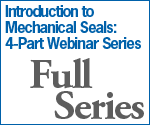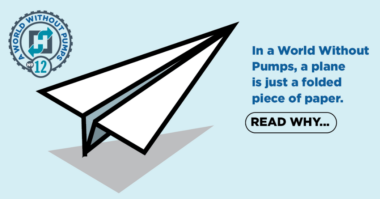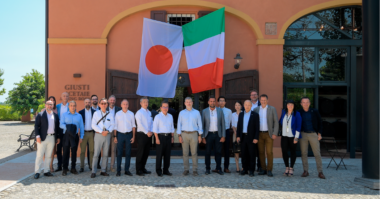Many technical and non-technical employees don’t have an in-depth understanding of the different types of seals and operating principles, construction and design installation, connections, commissioning, seal environments and seal failure analysis. Introduction to Mechanical Seals is a comprehensive, four-part webinar series, developed by the Fluid Sealing Association (FSA) in cooperation with the Hydraulic Institute, which covers these various topics in detail. This popular webinar program continues to be well received throughout the pumping industry.
Whether it’s your internal employees, distributors, pump end users, maintenance or operations personnel, this series is a must for those who are involved with today’s complex pumps. Introduction to Mechanical Seals provides the most comprehensive overview on sealing systems and can be attended as a full, four-part series or in individual sessions. The series consists of the following sessions:
Session 1 – Types & Operating Principles: The first session will cover how mechanical seals work and will also offer an overview of the most common seal types. The objectives are to give participants a good understanding of how leakage, friction and wear of the materials interact and why many different seal types are used in pumps, agitators, and compressors.
Session 2 – Construction and Design: Different design features used in common seals are discussed in this session. Strengths and weaknesses of various design options and the impact of design features on seal performance will be covered. This session will also cover seal faces, springs, seal glands, and more.
Session 3 – Installation, Connections, & Commissioning: The third session covers mechanical seals used in rotary equipment, basic preparation and standards as well as support system piping plans that result in longer seal life.
Session 4 – Seal Environment and Failure Analysis: The final session explains how to improve material selection, environmental controls, and installation and operating procedures.
The full series is only $299, with all attending engineers earning 4 PDH credits at the conclusion of all four sessions. Alternatively, single session registration is available as needed for $100 each. As this live, online series is only offered periodically throughout the year, sign up is required by noon on March 27, 2014 to ensure your participation. If you have any questions, please contact Mark Sullivan, Director, Marketing & Education, Hydraulic Institute, at 973-349-5329.
Registration is available now at: http://estore.pumps.org/Introduction-to-Mechanical-Seals-4-Part-Webinar-Series-P193C28.aspx.





How does the webinar work? How long is each session? What time of day? I assume it’s live over the computer so you can ask questions etc?
I’ll send you an email with the details.